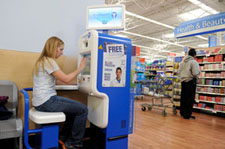- Home
- News
- Features
- Topics
- Labor
- Management
- Opinions/Blogs
- Tools & Resources
Wal-Mart Health Screening Stations Part Of ‘Self-Service Revolution’
By JULIE APPLEBY, KHN, STERLING, Va.– Perched by a computer monitor wedged between shelves of cough drops and the pharmacy in a bustling Wal-Mart, Mohamed Khader taps out answers to questions such as how often he eats vegetables, whether anyone in his family has diabetes and his age.
He tests his eyesight, weighs himself and checks his blood pressure as a middle-aged couple watches at the blue-and-white SoloHealth station advertising “free health screenings.”
“You may not go to the doctor every year, but you come to Wal-Mart often,” says the fit-looking 43-year-old Khader who lives in nearby Ashburn, Va. “I get bored while my wife is shopping. This is a time killer. I’ll come back in two months or so, and track my results.”
A burgeoning consumer health industry is betting that millions of consumers will do just that.
As Americans gain coverage under the federal health law, putting increased demand on primary care doctors and spurring interest in cheaper, more convenient care, unmanned kiosks like these may be part of what their manufacturer bills as a “self-service health care revolution.”

The SoloHealth Station gives consumers free and convenient access to health care by allowing them to screen their vision, blood pressure, weight, and body mass index — or any combination of the four–in seven minutes or less for free, according to the manufacturer (Photo Jack Gruber/USA Today).
From SoloHealth’s stations, slated to be in 2,500 Wal-Mart and Sam’s Clubs next month, to video consultations with doctors, to smartphone apps that track blood pressure and heart rate, consumer health technology is attracting big-name backers such as retailer Wal-Mart, health insurers Wellpoint and UnitedHealthcare and companies that make or distribute medical products, such as Johnson & Johnson and Cardinal Health.
Wal-Mart’s interest is especially significant, given the giant retailer’s reach, the growth of its pharmacies and retail medical clinics and a top official’s recent statements — since walked back by the company — outlining plans for a push into primary care.
Some doctors’ groups and consumer advocates urge caution, raising concerns about how companies might use personal health data, the quality of their medical information and whether advertisers and other sponsors might shape their advice and referrals for commercial reasons.
“There is a trend in general by retailers and health insurers to provide ‘fluff’ to consumers in the guise of real medical information as an advertising delivery device,” says Carmen Balber of the left leaning advocacy group Consumer Watchdog.
Wal-Mart Bringing Exam Rooms To Patients
Wal-Mart spokeswoman Danit Marquardt says the placement of SoloHealth stations in many stores is part of the retailer’s commitment to “testing new products and services and ways to keep customers healthy.”
“We don’t have a larger plan for primary care at this time,” she added.
But SoloHealth’s backers do have larger plans. The Duluth, Ga.-based company aims to expand its kiosk offerings to teach people how to quit smoking, test whether they are at risk for diabetes and even enroll them in health coverage.Self-serve computer stations are also eyed as a way to help consumers figure out whether they need medications for conditions such as high cholesterol, under a proposal now before the FDA to make some prescription medications over the counter.
“It is clear there are now many interactive mechanisms that can step the consumer through the process of self-diagnosis and medication selection,” said Janet Woodcock, director of the FDA’s Center for Drug Evaluation and Research at a public hearing last March.
The proposal is still under review.
Rival firms are marketing similar technologies. Dublin-Ohio based HealthSpot has enclosed cubicles that allow patients to pay $59 to $79 for a video “visit” with a doctor. NowClinic online, a subsidiary of UnitedHealth Group, provides 10-minute video chats with physicians for $45.
Technology “has become a new arm of the health care delivery system,” says Jay Sanders, an adjunct professor at Johns Hopkins University and CEO of The Global Telemedicine Group, a consulting firm in McLean, Va. “You need to bring the exam room to where the patient is, not where the doctor is.”
Please click the page number below the share bar to continue reading
1 2
List your business in the premium web directory for free This website is listed under Human Resources Directory




